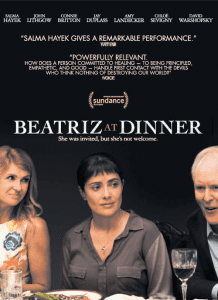On June 1st, President Trump announced that the United States would be pulling out of the Paris climate accord, a voluntary agreement among many nations to reduce greenhouse gas emissions. This move, of course, stirred up a lot of conversation about the environment, politics, and the role of the United States in world affairs.
Leaving politics aside (if possible), the question of care for the environment is not an irrelevant question. For some people, it is the issue facing us today, since, in their estimation, the current trajectory of climate change, pollution, and the wasting of natural resources puts us on a trajectory to have an essentially uninhabitable world in the not-too-distant future.
 In two films this year, Mother! (just released in theaters) and Beatriz at Dinner (newly released on DVD), the question of environmental care is front and center in the larger meaning of each film. They are very different films, but both come to grim conclusions about the future of our world.
In two films this year, Mother! (just released in theaters) and Beatriz at Dinner (newly released on DVD), the question of environmental care is front and center in the larger meaning of each film. They are very different films, but both come to grim conclusions about the future of our world.
In Darren Aronofsky’s Mother!, the filmmaker continues some themes he began with his much-maligned but thoughtful 2014 film Noah, mainly how humanity is destroying the world and how God responds to our destruction. The characters in Mother! do not have names and are clearly archetypes, and religious archetypes at that. Without getting too much into spoiler territory, it’s enough for me to say that while Mother! has a character who represents God, it does not represent Him in a positive light. In fact, it sees God as being a permissive, emotionally fragile being who not only can’t stop humans from destroying themselves and the world, but might actually benefit from, and enjoy watching, the carnage. If you were to characterize this character as a “capricious monster” and this movie as “blasphemous,” I wouldn’t disagree with you.
In Miguel Arteta’s Beatriz at Dinner, the characters have names and are not so much archetypal as they are representative of political positions. Salma Hayek’s Beatriz, an immigrant New Age healer, finds herself at a dinner party locking horns with John Lithgow’s Doug, a Trump-like developer who destroys land and animals for sport or gain. Beatrice realizes, after much conversation and drinking, that despite her best efforts, she is in a position of powerlessness and must decide between two drastic courses of action.
Both films assume that human greed and carelessness will cause not only pain but costly, even sacrificial, death. Further, both films have a hopeless feel to them, as if there is very little that can be done to stop bad people, and even bad deities, from destroying the world.
 As a Christian, I share much of the concern, but I don’t share the hopelessness. I do think that environmental issues should matter to Christians. Besides the fact that our environmental attitudes and practices have a very big evangelistic impact on how non-Christians see us, the question matters because God’s word tells us that it’s God’s world that He called good and never says should be destroyed (purified, as in the flood and 2 Peter 3:10, but never done away with).
As a Christian, I share much of the concern, but I don’t share the hopelessness. I do think that environmental issues should matter to Christians. Besides the fact that our environmental attitudes and practices have a very big evangelistic impact on how non-Christians see us, the question matters because God’s word tells us that it’s God’s world that He called good and never says should be destroyed (purified, as in the flood and 2 Peter 3:10, but never done away with).
In the book of Genesis, Adam and Eve were given the garden og Eden to tend and were commanded by God to be fruitful and to subdue the earth have dominion over its living things (what we call the cultural mandate, Genesis 1:28). The idea is that they, and all who come after them, are to take care of the world and to make it a place of flourishing for all people and all living things. Later in Genesis, after the flood, God not only makes a covenant agreement with Noah, He makes it with all the animals as well, saying that He will never destroy the earth by a flood (Genesis 9:8-17).
John Frame comments on the implications of the cultural mandate in Doctrine of the Christian Life, “[A]lthough God has a special concern for human life, he is concerned analogously for the whole creation, for all forms of life. He made man to have dominion over the world. But man is not only the lord of creation; he is himself a creature, made of dust. And he is dependent on the rest of creation for his sustenance. So man is to use the resources of the world, but is not to exploit or deplete them. If those resources are depleted, the natural consequence is that man himself suffers. Man must be a responsible steward of the earth if he is to preserve his own life… So the cultural mandate calls us to plan for balanced use of the earth’s resource, for the well-being of mankind and for the glory of God” (744-745).
The Apostle Paul, in Romans 8, says that creation “waits with eager longing for the revealing of the sons of God. For the creation was subjected to futility, not willingly, but because of him [Adam] who subjected it, in hope that the creation itself will be set free from its bondage to corruption and obtain the freedom of the glory of the children of God.” Paul is telling us that one day the curse of sin will be lifted and not only will human beings be glorified, but the world will be as well (John envisions this happening in his vision of the new heavens and the new earth in Revelation 21).
So, should we care for God’s world as best we can? Yes.
Does our lack of care at times do serious damage to not only animals, trees, and landscapes, but to vulnerable humans as well? Yes.
Can we trust that God will take care of His world and His people? Yes!
How do we know that God will preserve and defend His creation? Because of the resurrection. After Jesus died, He was raised to new life with a glorified body that could both pass through walls and eat food. This is the ‘firstfruits’ of the new creation, a powerful reminder and marker that God will make all things new, triumphing over death and decay, and ushering in a new Jerusalem that is a new and greater Eden.
As Wayne Grudem writes in his Systematic Theology, “God will not completely destroy the physical world (which would be an acknowledgement that sin had frustrated and defeated God’s purposes), but rather he will perfect the entire creation and bring it into harmony with the purposes for which he originally created it. Therefore we can expect that in the new heavens and new earth there will be a fully perfect earth that is once again ‘very good.’ And we can expect that we will have physical bodies that will once again be ‘very good’ in God’s sight, and that will function to fulfill the purpose for which he originally placed man on the earth.”
This is the good news that both Mother! and Beatriz sadly lack.













